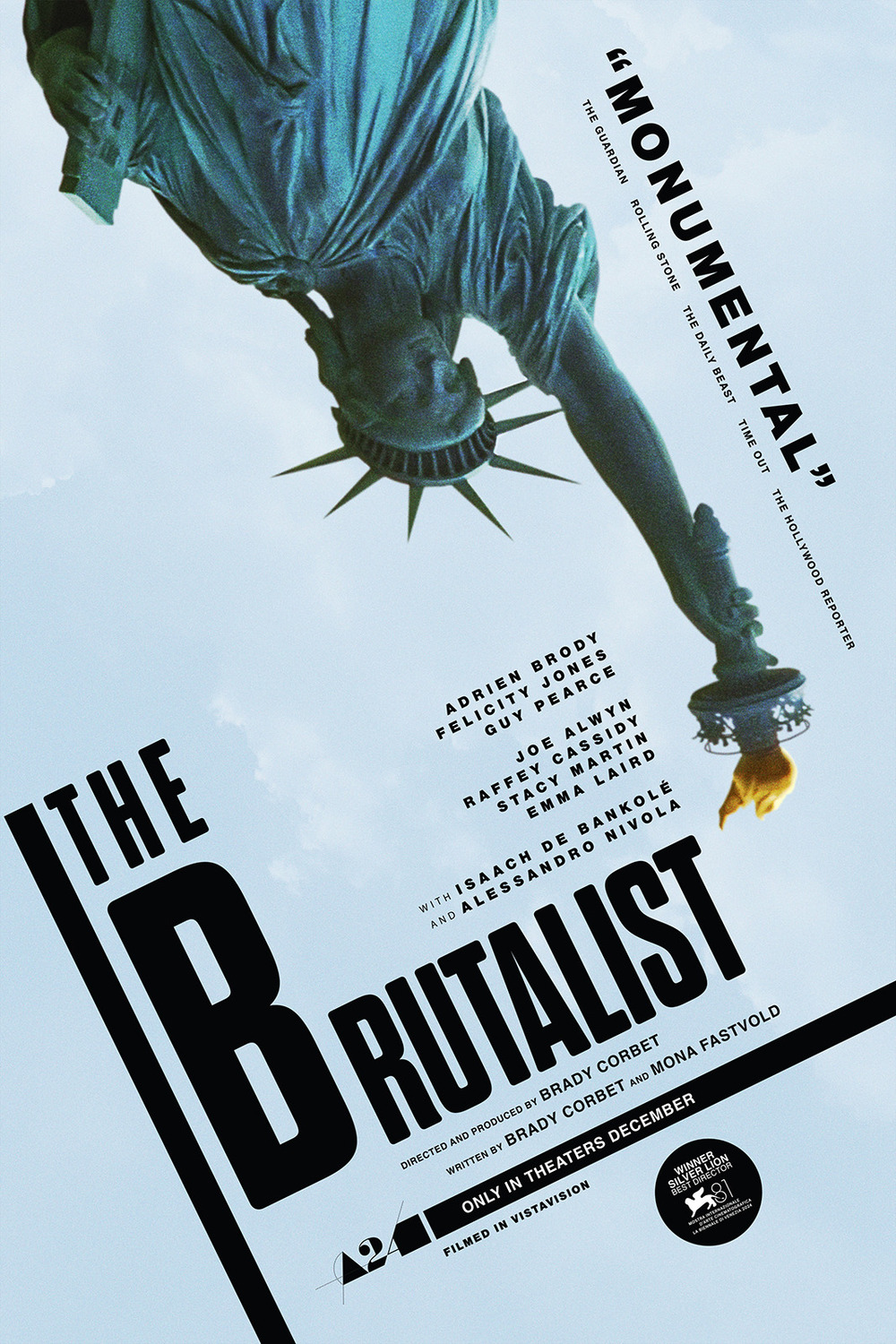Director
Brady Corbet
Starring
Adrien Brody
Guy Pearce
Felicity Jones
Having survived the horrors of the holocaust, Laszlo Toth [Brody] makes the long and difficult journey to America, to stay with his cousin in Philadelphia. Putting his skills as a Bauhaus-trained architect to work, he overhauls a study into a modern library for wealthy tycoon Harrison Lee Van Buren [Pearce]. Eventually, Van Buren comes to appreciate the merits of Toth’s work and contracts him to build an ambitious multi-faceted project on a nearby hill. In addition to fiscal compensation, Van Buren pulls strings and connections to get Toth’s wife [Jones] and orphaned niece out of Europe and safely to America.
Filmed on a budget of less than $10 million, the scope, scale and ambition of this movie are a minor miracle. It is, without question, classic grand storytelling the likes of which are usually confined to the pages of dense novels. And while the runtime is daunting and the subject matter heavy, its character studies alone are worth the time and investment; especially as it’s punctuated with a gratefully received intermission. But, this praise is largely born from an appreciation of The Brutalist’s construction. Structurally and analytically, it’s a tempered masterpiece. But as an enjoyable experience? That’s more subjective and most audiences will genuinely struggle with this feature.
First up, let’s get the obvious out of the way. Corbet has written and directed a beautifully and painfully presented film. Mostly shot with a tight intimacy, the times we’re offered big broad landscape vistas, the music is imposing and the 70mm presentation excels. The camera uses space with the same consideration an architect has for emotion and presence. Plunging the audience into claustrophobic darkness, or showing the wind whistle and race across the barren, open hilltops. Similarly Daniel Blumberg’s score presents a mix of soft piano and towering strings which take you off your feet. Everything is designed to feel grand, not necessarily to induce awe, but to make Laszlo (and by extension, the audience) feel small.
Ultimately, The Brutalist serves as a dual-purpose story. On the one hand, a breakdown of the immigrant story in America, and on the other, the constant war between artist and patron. Regarding the former, there isn’t a universal relatability. Toth is a refugee and gets swept up in Van Buren’s patronage, while struggling with drug addiction. But the blueprints for othering, exclusion, distrust, dwindling opportunities, a camaraderie with those in a similar state – these elements are easier to parallel. Speaking of that tight framing, you have a wonderful juxtaposition between the raucous energy of the underground jazz club, acting in stark contrast to the chaos of the shipping quarters that brought Laszlo to the US. Both are shot with similar frenetic framing, giving the audience the feeling of being passed from pillar to post, yet both are deceptive in the uncertainty of their respective conclusions.
Coming back to that latter point, Toth is, like all artists, constantly at war with the compromises and mercurial inconsistencies from his benefactors. His architectural plans are that of a giant vision (an almost impossible brief to complete) that is constantly stripped back and back until it threatens to become simply dull and uninspired. All of which is exacerbated thanks to various vultures siphoning funds – “everything ugly, cruel, stupid and most importantly ugly is your fault.” But these two themes cannot be separated and continue to weave themselves into one another. The Van Burens treat Toth almost like a pet, probing into his history and the state of Europe with insensitive questions. Creating the growing feeling that, despite being actively told he is a respected individual, it’s clear he has to continually fight to justify his place. Whether due to his ethnicity, his religion, his birthplace, or his credentials.
It would be absolutely impossible to endure such a lengthy feature without top-rate performances, and Corbet (being an actor himself) has assembled a tight ensemble to carry us through this world. Brody is on screen so much and is afforded so little in the way of joviality. He is constantly on edge, highly-sprung, and desperately trying to capture some form of a living. This is heightened doubly so in the second half where he is finally reunited with his wife, Erzebet, only to find they have distinct trouble reconnecting. And starting out as a presence represented through a handful of lines of dialogue and Laszlo’s yearning, the pressure on Jones to deliver upon arrival is immense. And yet, the character she brings to life is so much more fascinating and compelling than we could have been led to believe.
It is, however, my firm belief that Guy Pearce as Harrison Lee Van Buren is one of his most fascinating characters. Like all wealthy industrialists, he has an inflated sense of ego and importance, as well as his desperation to leave a legacy before he departs this world. On the surface, he comes off as charming and supportive. But the reality quickly reveals itself that he is in fact a spiteful, vindictive, cruel man, whose real legacy is the corrupt, corner-cutting empire he has formed and the moral behaviour he has instilled in his children (namely his son).
**spoilers within**
Looking back on The Brutalist, there are so many wonderful standout scenes, monologues, and confrontations. It is a movie that actors dream of being involved in. One of clear objectives, but also hidden meaning and complexity that is merely alluded to. That said, the ending does sour the overall experience. There are a few time-skips that leave us with a handful of unanswered questions. These are, of course, forgivable and encourage the viewer to discuss and fill in the blanks. However, in its closing epilogue, the movie leaps ahead two decades to a convention in Venice, honouring Toth’s career. It’s here that we learn his construction for Van Buren was eventually finished and its true secret purpose was to reflect the respective camps that he and his wife were kept in during the war. Rather than feeling a rush of euphoria from this revelation (as it explains Toth’s almost obsessive perseverance) it feels like a battering of exposition. Instead of reworking how I viewed the previous events, this underlying personal secrecy felt like disconnected tissue. As if we were denied a more paced and methodical unveiling, for a snap-reveal. And, of course, replacing Blumberg’s score with period-appropriate 80s music is just the most jarring experience.
But in spite of the slightly discombobulating finale, The Brutalist remains haunting, mature, throwback cinema. It’s an unapologetic feature that comes out with the gravitas and weight of a Terrence Malick or Paul Thomas Anderson release. Powerful characters expressing strong themes of intimacy, identity, hope and misery, it acts as a prime example of American capitalistic class culture. Yes, it’s weighty, imposing, and at times excessive, but it’s bold and determined, and as such deserves respect.
Release Date:
31 January 2025
The Scene To Look Out For:
A very quick way for a writer to convey a character’s quality is to give them a choice. That way the audience understands their moral compass and foibles. This is initially difficult with Van Buren because he is first introduced shocked and screaming at the presence of people in his house. He then later apologises and explains his mother was near death and he was caught off guard. So which are we to believe? While his introduction is two-fold, it’s through a conversation with Toth, that we understand Van Buren and his intentions perfectly. He details that he had a great fondness for his late mother and nothing but resentment for his grandparents. He further elaborates by telling a story about how he wrote a cheque to essentially have nothing more to do with their daughter. But it’s through the trickery and bait and switch that he orchestrates this exchange that we witness a Godfather-like callousness. This is a man who does not respect people, he sees them as lesser beings, to be dealt with as he sees fit.
Notable Characters:
One other crucial character is Toth’s niece Zsofia [Raffey Cassidy]. After the events of the war, she has become mute and doesn’t show signs of improving. Demure and retreated, she clearly understands the world around her but cannot engage with it. She is simultaneously engrossing and yet underdeveloped. This is magnified with the various time jumps, where we do not see any of her progress, merely that she improves or worsens accordingly. I have little doubt that there is an extended cut or several pages of a script that deepen her character and offer us a stronger explanation. But, as it stands, Zsofia is a regrettably inchoate presence.
Highlighted Quote:
“This is place is rotten. The landscape the food we eat. The whole country is rotten.”
In A Few Words:
“A thundering achievement but not one without its flaws causing it to buckle slightly under its own towering weight.”
Total Score: 4/5

![The Red Right Hand Movie Reviews [Matthew Stogdon]](https://reviews.theredrighthand.co.uk/wp-content/uploads/2021/12/cropped-header1.png)



